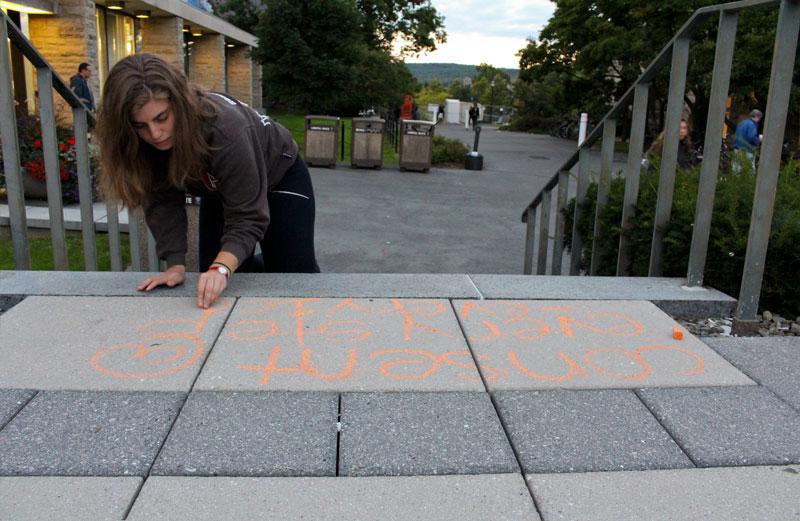The event took place a week before President Barack Obama and Vice President Joe Biden plan to announce a national sexual assault awareness campaign, “It’s On Us.” This campaign will use social media and partnerships with other colleges to prevent sexual assault, with a special focus on male student engagement.
Cornell University is not listed on the Department of Education List of Higher Education Institutions with Open Title IX Sexual Violence investigations, which was released early last May. The closest university in the Ithaca area to be featured on this list was SUNY Binghamton.
Still, students believe the university can be doing more to change the culture and practice of sexual assault. The Every1 Campaign would like more collaboration with the administration to provide constant and inclusive education on sexual assault.
The Every1 Campaign, a student-led endeavor, is centered on finding alternative and innovative methods to educating the campus community on the culture of sexual assault. The students chalked the steps to provide a physical and direct message to the campus.
In the past week, the campaign has “brought the bedroom” to the campus with its “Pillow Talk” event. They set up a bed on the Campus Art Quad and invited students to share their opinions about consent and sex.
“For us to be able to bring students into the space and literally tear down the wall of the bedroom, so to speak, it was really effective,” said Jevan Hutson, ‘16, creative director of the campaign.
“Our campaign focuses heavily on education, and that’s something that we see the university not really being proactive about,” Emma Court, ‘15, president of the Every1 Campaign, said. “In order to combat this issue, which is an incredibly large issue, you need to be proactive on all fronts.”
When the Cornell Media Relations department was contacted for questions regarding existing policies, their offices declined to provide Ithaca Week with a source to comment.
The Every1 Campaign was created in 2012 by Leah Salgado, ‘12, a former student at Cornell University. After taking a course on violence against women, Salgado saw a need for more educational outreach about sexual assault on campus, specifically in LGBTQAI communities and communities of color.
Hutson said conversations surrounding consent are necessary and should be inclusive for all sexualities, ethnicities, and genders.
“When it comes to our program we engage with all identities, both sexual and both gendered,” he said. “We don’t frame the narrative in these conversations as ‘let’s talk about straight White men and the way in which they rape. There is a reason why we call ourselves the Every1 Campaign; one of our phrases is ‘everyone may be the problem, but everyone is the solution.’”
As a part of the national conversation on this topic, Columbia University students have organized to support Emma Sulkowicz, ‘15, a Columbia student who was raped on the first day of her sophomore year. Meanwhile, California is seeking to require all colleges receiving state funds to mandate active consent among students in sexual encounters.
Hutson said while new legislation can be a good platform for campus discussions, the conversation is long overdue.
“The national dialogue now is prime for this conversation,” Hutson said. “Quite frankly, I was very excited about it because everyone was catching on. This is ‘the time,’ so to speak. Really this should have been happening years ago, but at least right now we’re able to capitalize off the national dialogue.”
Kristen Green, ‘17, a student involved in the campaign, said having access to the victim advocate and the resources at the Gannett Center on campus is a first step, but more can be done.
“I think that they need to really expand their base because so many people are coming to them that they can’t get to your case for weeks,” Green said. “They need to expand their resources further and there needs to be harsher consequences for perpetrators.”
As students settle into the semester, the Every1 Campaign is continuing to organize more educational events to raise more awareness. One event in the works is “Take Back the Top 40,” where they will change lyrics in the Top 40 hits to encourage healthy, consensual sexual relationships.







